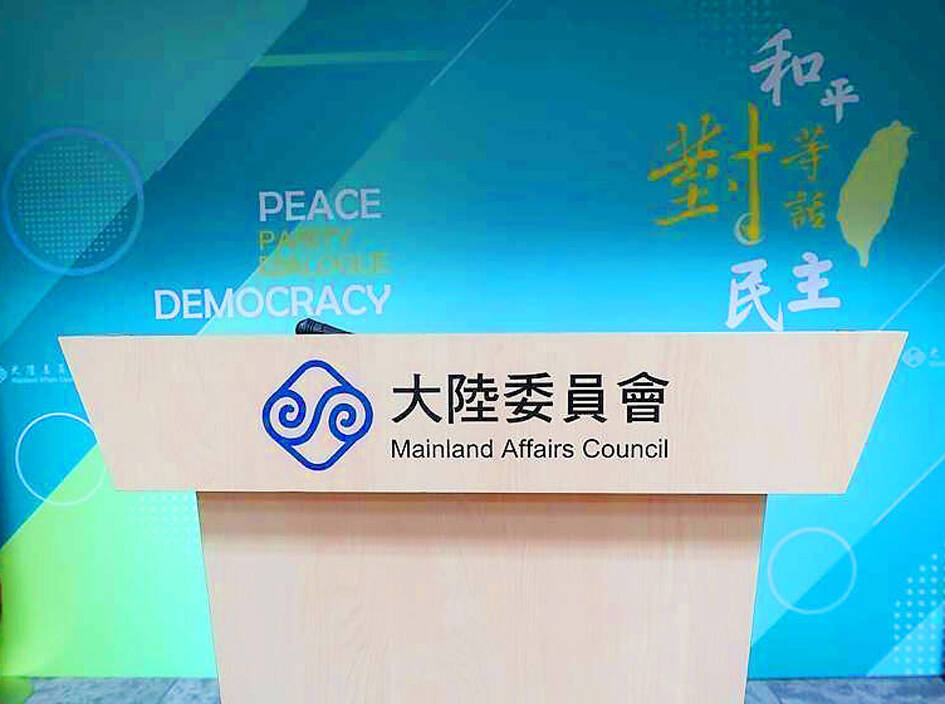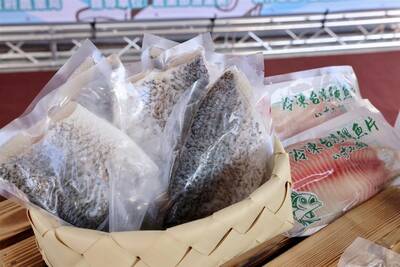President William Lai’s (賴清德) statement that the Republic of China (ROC) and the People’s Republic of China (PRC) are not subordinate to each other is in line with the Constitution, Mainland Affairs Council (MAC) Deputy Minister Liang Wen-chieh (梁文傑) said on Monday.
Liang cited the preface to the Additional Articles of the Constitution of the Republic of China (中華民國憲法增修條文), which state that the additional articles were enacted “to meet the requisites of the nation prior to national unification,” meaning that as the situation stands, neither side has jurisdiction over the other.
“Two phrases used to describe the relationship — ‘two sides of the [Taiwan] Strait’ and ‘the ROC and the PRC’ — mean the same thing,” Liang said.

Photo: Chung Li-hua, Taipei Times
It would not matter if the president were to follow a “one China” constitution, as Beijing would criticize him regardless, as the ROC in Beijing’s eyes is an “illegitimate government” that does not exist, or should not exist, Liang said, adding that China’s stance is that adhering to the Constitution is an act of declaring “zhonghua independence,” which to it is the same as Taiwanese independence.
Former president Ma Ying-jeou (馬英九) of the Chinese Nationalist Party (KMT) also insisted on the ROC’s sovereignty and commented that the nation’s fate should be decided by its citizens, Liang said.
Beijing would disagree with that stance, as it would “consider it to be pro-independence,” he said.
The MAC was created according to the Act Governing Relations Between the People of the Taiwan Area and the Mainland Area (台灣地區與大陸地區人民關係條例) and Lai’s comments adhere to the act and the Constitution, he said.
Other legislation also treats China as an independent country, Liang added, citing as examples the National Health Insurance only applying to citizens of Taiwan and the inability of Shanghai residents to perform their military service in Taiwan.
While the Constitution theoretically encompasses both sides of the Taiwan Strait, the two sides are actually two separate countries, he said.
Regarding other matters, Liang said that a claim by China’s Taiwan Affairs Office that China’s National Security Act does not affect the majority of Taiwanese was shown to be a blatant lie by reports of a Taiwanese businessperson falling afoul of that legislation.
When Mao Zedong (毛澤東) initiated his purge of right-wing dissidents, he claimed only 4,000 were affected, but about 550,000 dissidents were sent to labor reform camps, Liang said.
Separately yesterday, KMT Legislator Lo Ming-tsai (羅明才) told a plenary session at the legislature that businesspeople in the US and Europe are worried that Premier Cho Jung-tai (卓榮泰) would push policies favoring Taiwanese independence.
Cho said the ROC is a sovereign, independent nation and the government’s chief task is to maintain the “status quo,” and foster peaceful development in the Indo-Pacific region and cross-strait affairs.
Additional reporting by Chen Cheng-yu

Taiwan's Vice President Hsiao Bi-khim (蕭美琴) said Saturday that she would not be intimidated by the Chinese Communist Party (CCP), following reports that Chinese agents planned to ram her car during a visit to the Czech Republic last year. "I had a great visit to Prague & thank the Czech authorities for their hospitality & ensuring my safety," Hsiao said on social media platform X. "The CCP's unlawful activities will NOT intimidate me from voicing Taiwan's interests in the international community," she wrote. Hsiao visited the Czech Republic on March 18 last year as vice president-elect and met with Czech Senate leadership, including

There have been clear signs of Chinese Communist Party (CCP) attempts to interfere in the nationwide recall vote on July 26 in support of Chinese Nationalist Party (KMT) legislators facing recall, an unnamed government official said, warning about possible further actions. The CCP is actively involved in Taiwanese politics, and interference in the recall vote is to be expected, with multiple Chinese state media and TAO attempts to discredit the Democratic Progressive Party (DPP) and undermine public support of their recall movement, the official said. This interference includes a smear campaign initiated this month by a pro-Beijing Hong Kong news outlet against

A week-long exhibition on modern Tibetan history and the Dalai Lama’s global advocacy opened yesterday in Taipei, featuring quotes and artworks highlighting human rights and China’s ongoing repression of Tibetans, Hong Kongers and Uighurs. The exhibition, the first organized by the Human Rights Network for Tibet and Taiwan (HRNTT), is titled “From the Snowy Ridges to the Ocean of Wisdom.” “It would be impossible for Tibetans inside Tibet to hold an exhibition like this — we can do it. because we live in a free and democratic country,” HRNTT secretary-general Tashi Tsering said. Tashi Tsering, a Taiwan-based Tibetan who has never

A first shipment of five tons of Taiwan tilapia was sent from Tainan to Singapore on Wednesday, following an order valued at NT$600,000 (US$20,500) placed with a company in the city. The products, including frozen whole fish and pre- cooked fish belly, were dispatched from Jiangjun Fishing Harbor, where a new aquatic processing and logistics center is under construction. At the launch, Tainan Mayor Huang Wei-che (黃偉哲) called the move a “breakthrough,” marking Taiwan’s expansion into the Singaporean tilapia market. Taiwan’s tilapia exports have traditionally focused on the United States, Canada, and the Middle East, Huang said, adding that the new foothold in